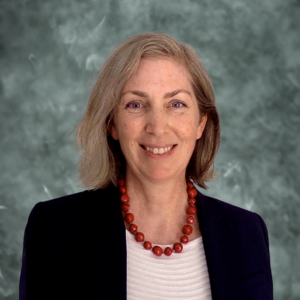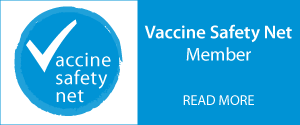
The Task Force for Global Health welcomes Dr. Eileen Farnon as Brighton Collaboration’s new Research Director. Dr. Farnon, who is trained in clinical infectious diseases, tropical medicine, and applied epidemiology, brings more than 20 years of experience in public health, including outbreak response and clinical research and development, to the Brighton Collaboration and the SPEAC project.
Dr. Farnon first became interested in vaccine safety in 2005 while working as an Epidemic Intelligence Service (EIS) officer in the Arboviral Diseases branch at the US Centers for Disease Control (CDC), after completing an Infectious Diseases fellowship at Emory University. “Working on describing severe adverse events and responding to a yellow fever outbreak where a mass immunization campaign was launched sparked my interest in vaccines and their safety,” she says. While in EIS, she was involved in the Yellow Fever Vaccine Safety Working Group (YFWG), working with the Vaccine Adverse Event Reporting System (VAERS) and the Clinical Immunization Safety Assessment (CISA) Project, investigating and summarizing events of yellow fever-associated neurotropic and viscerotropic disease. She served on the Advisory Committee on Immunization Practices (ACIP) Yellow Fever Work Group, which was formed to update the ACIP recommendations in 2008, particularly with regard to immunocompromised hosts.
Throughout her career at the CDC, Farnon responded to many domestic and international outbreaks. She described the first imported cases of Chikungunya virus infection to the U.S., and served on teams that responded to outbreaks including yellow fever in Sudan, unexplained encephalitis in Vietnam, and Rift Valley Fever in Kenya; as well as etiology studies of meningitis, encephalitis, and acute flaccid paralysis in Guatemala. After EIS, she served as the Epidemiology Unit Chief for the Viral Special Pathogens Branch, and responded to outbreaks of Marburg virus disease in Uganda, and Ebola virus disease in the Democratic Republic of Congo and Uganda, a novel arenavirus, Lujo virus, in South Africa and Zambia, as well as domestic outbreaks including transplant-transmitted LCMV and an imported case of Marburg hemorrhagic fever. She also worked as the Clinical Expert for the Parasitic Diseases Branch and as the Medical Officer for Transplant Safety, working on numerous investigations of transplant-transmitted diseases and discussing policy changes with partners. She later served in the Global Disease Detection Branch, collaborating with staff at 10 international CDC sites conducting syndromic surveillance and related studies of emerging infectious diseases at 10 international sites, and teams responding to emerging infectious disease outbreaks, including MERS-CoV in Jordan and Saudi Arabia; and participated in a polio surveillance assessment in Cote d’Ivoire. She also volunteered in Emory’s travel clinic, providing pre-travel consultations including vaccine recommendations, and post-travel evaluations for ill returned travelers.
Following her time at CDC, Dr. Farnon joined Temple University School of Medicine as an Associate Professor of Medicine in Infectious Diseases, teaching and consulting on general and transplant infectious diseases. “I was able to explore my interest in immunocompromised hosts further while working with oncology and transplant patients,” she says. “For transplant patients, the timing and safety of vaccinations pre- and post-transplant is especially important.” While at Temple, she also deployed to Liberia through WHO to assist the Infection Prevention and Control team during the 2014-16 Ebola outbreak. She subsequently worked at the Philadelphia Department of Public Health and supported local disease control including the Zika virus response in 2016. She created a new department for healthcare-associated infections (HAI) where she led surveillance and responses to HAI outbreaks, multidrug-resistant organisms, and infection control and response, including local Ebola preparedness.
More recently, Dr. Farnon was Director of the Outbreak Investigation Task Force at Institut Pasteur. This task force trained and deployed scientists in the Institut Pasteur International Network to respond to international outbreaks with other Pasteur Institutes, including plague in Madagascar, and through WHO/GOARN, including Ebola virus disease in DRC. She also worked on the Ethics and Regulatory work package of the African Coalition for Epidemic Research, Response, and Training (ALERRT) Network, formed to build capacity to conduct clinical trials during outbreaks in Africa.
Dr. Farnon also brings industry experience to Brighton. She worked on the clinical research and development teams for Pfizer’s Phase 3 maternal and older adult RSV vaccine trials, leading the clinical safety team for the latter. As part of the maternal immunization trial, the clinical team used the GAIA guidance to inform the trial protocol and related epidemiologic studies to assess background rates of expected adverse events. During the older adult trial, she led the clinical safety team and applied the Brighton Case Definition for Guillain Barré Syndrome (GBS) and SPEAC Companion Guide for GBS as part of their work. “This role demonstrated to me the power of Brighton Case Definitions and SPEAC’s work,” she says.
As Senior Director for Global Medical Affairs for HPV vaccines at Merck, Dr. Farnon’s work involved scientific discourse with stakeholders including NITAGs and professional societies, as well as providing education about HPV vaccines and HPV-related diseases for clinicians and public health stakeholders. She noted that “Safety concerns have been the primary reason cited for low HPV vaccine acceptance among the public. That opened my eyes to how concerns about vaccine safety can prevent many people from being protected adequately against diseases, despite the existence of very safe and effective vaccines.”
Farnon also gained experience in the biotech industry. As Executive Director of Clinical Development and Medical Affairs for a venture-backed new company, she worked on the Clinical research and development team for two phase I trials for vaccines targeting emerging infectious diseases and explored the landscape for possible additional disease targets and novel vaccine delivery systems. As part of the phase I trials, she led the protocol safety review team meetings to review safety data.
Now part of Brighton Collaboration’s team, Dr. Farnon is excited to support its stakeholders in assessing and communicating information about vaccine safety, and applying Brighton’s work to vaccine development for CEPI’s priority pathogens through the SPEAC project. “The role of Brighton is incredibly important to facilitate investigation of possible safety issues associated with vaccines and help researchers and other stakeholders to describe the true risk and benefit of vaccines. Brighton’s work helps to ensure that National Immunization Technical Advisory Groups (NITAGs) can adequately assess vaccine safety data, providers can tailor recommendations to their patients, and the public can be confident knowing that vaccine recommendations are based on robust, ongoing safety assessments.”



